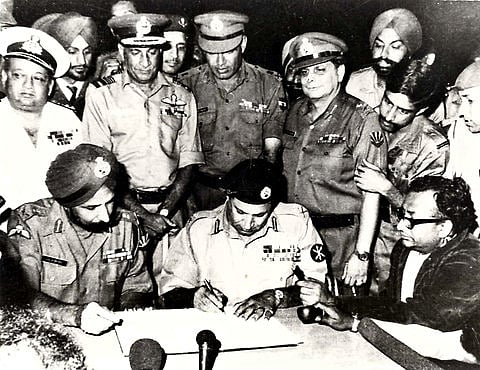

NEW DELHI: The India-Pakistan War of 1971, the anniversary of its conclusion that India will be observing tomorrow, would be remembered as the war of the century. The war, which commenced on December 3, and concluded on December 16, ended in a crushing defeat of the Pakistan armed forces.
It saw the surrender of 92,000 Pakistani troops in East Pakistan and in the creation of Bangladesh out of what was then East Pakistan.
As the Public Relations Officer for the Army, I had the opportunity to disseminate information about the operations regarding the India-Pakistan War of 1971.
The 1971 war was the result of a crackdown by Pakistan on its eastern wing when there was an uprising there following the refusal of the military rulers to hand over power to Sheikh Mujibur Rahman, who won the parliamentary elections with 167 of the 169 seats in East Pakistan and secured a simple majority in the 313 lower house of the Pakistan Parliament. He should have been made the Prime Minister of Pakistan.
Pakistan’s then martial law administrator General Yahya Khan ordered the military to launch a crackdown in Dacca against the Awami League and Mujibur Rahman was arrested and taken to West Pakistan in the month of March.
General Yahya Khan sent Lt. Gen. Tikka Khan to put down the disturbances in East Pakistan. In the crackdown that followed, hundreds of thousands of innocent people were massacred and over ten million fled to India to save themselves. People of East Pakistan raised the Mukti Bahini to liberate themselves from this oppressive rule.
India’s then Prime Minister Indira Gandhi expressed her full support to Sheikh Mujibur Rahman for his struggle for freedom. She launched a diplomatic offensive to make the world aware of the ‘demographic aggression’, against India and entered into a twenty -year treaty of friendship and cooperation with the Soviet Union.
Meanwhile, on the advice of the Indian Chief of Army Staff, General S.H.F. J. Manekshaw, she deferred action on the East Pakistan border till the Himalayan hills were closed by snow.
India a responded to this 'demographic aggression' by supporting the 'Mukti Bahini', and the war between India and Pakistan broke out when the Pakistan Air Force carried out attacks on India on December 3.
The war, which lasted for 12 days, concluded quickly following the airdrop of surrender documents which assured Pakistani soldiers that they will safely evacuated out of East Pakistan and returned to their country.
The Indian Army secured the surrender of the Pakistan Army. The surrender documents were signed in Dacca by Lt. Gen AAK Niazi and Lt. Gen J. Arora, India’s eastern army commander.
Indira Gandhi, Prime Minister of India, invited Zulfiqar Ali Bhutto, her counterpart from Pakistan, for talks in Shimla in July 1972. It was agreed at Shimla that the prisoners of war would be returned to Pakistan; captured territories along the Western border, except in Jammu and Kashmir returned; the cease-fire line would be converted as the Line of Control and Pakistan would take steps to convert it into an international border, with the hope that peace would prevail in the subcontinent.
The hope melted away with the army taking over power again. In the power struggle that followed in Pakistan Prime Minister Zulfiqar Ali Bhutto was arrested and sentenced to death.
General Zia-ul-Haq, who assumed power in 1979, became an ally with western powers following the Soviet invasion of Afghanistan. In the years that followed he was instrumental in executing the 'proxy-war' techniques in Afghanistan.
India has to accept that Pakistan will continue its 'proxy war' against it, carry out terrorist attacks, even though the terrorists have been destabilizing that country itself.
Even after 45 years of the creation of Bangladesh, Pakistan is unable to accept that it lost the 1971 war because it refused to make Shiekh Mujibur Rehman the Prime Minister of Pakistan and killed millions of its own citizens in the eastern wing. It is determined to conduct a proxy war against India.
Tomorrow, the country will pay tribute to those brave soldiers who fought in what strategic experts refer to as the "war of the century"
Mr. I. Ramamohan Rao is a former Principal Information Officer of the Government of India. He can be reached on his e-mail raoramamohan@hotmail.com